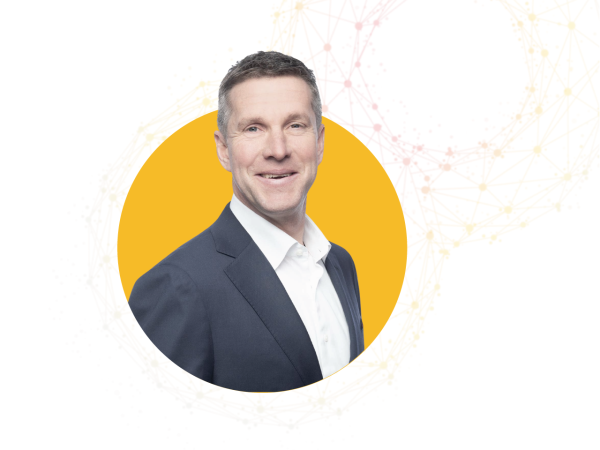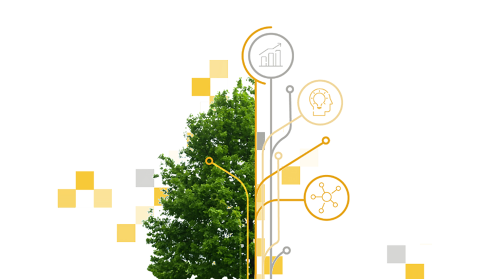
"We bring together solutions for shippers and carriers"
02/06/2023 | 15 min
DVZ: In mid-December, the takeover of Transporeon by the US technology company Trimble was announced. In your role as Transporeon CEO, how involved were you in the negotiations?
Stephan Sieber: This period was also very intense for me personally. We received a lot of interest in Transporeon from different directions during 2022. In late summer, we then decided to hold concrete talks. Of course, I was involved from start to finish. At the same time, however, I still had to manage the business. That was an exciting but also exhausting time.
How many potential buyers have you had concrete discussions with?
There were definitely a few alternatives, even though I can't name a number here. The interested parties were of a very different nature. On the one hand, there were strategic investors such as Trimble, i.e. technology and transport companies. On the other hand, of course, there were also potential financial investors. We gradually thinned out this group and then took a closer look at a handful of offers.
With Trimble, a technology company as a strategic investor was ultimately awarded the contract. Was this the preferred model from the outset, or did you go into the process with an open mind?
We approached this with an open mind. We had always considered the possibility that it could become a strategic acquirer. The talks didn't happen spontaneously; some of them had been going on for months, if not years. But then we got to know the different parties even better, compared philosophies and saw how it would fit best. Basically, I believe that Transporeon is a high-quality company that can be successful in different ownership structures. But I am now happy with the solution we have found. I think it is the best solution we could have found in the interests of Transporeon, our employees and our customers. But there would also have been other options.
Why is a technology company a better buyer for you than a company from the logistics sector?
Trimble already has a relatively strong footprint in the transport industry, but comes more from the carrier side, i.e. from fleet operators. With Transporeon, we are not yet as strong in this area. It is only in recent years that we have increasingly focused on the carriers as well. So, we are trying to solve the same problem from two different directions. Of course, a classic logistics service provider would also have been an option for us. But we have to be honest and say that this might have called our neutrality as a digital platform into question to some extent.
Stephan Sieber
The 47-year-old has been CEO of Transporeon since November 2019. Most recently, he worked for ERP provider Unit4 for five years and before that at SAP for 13 years, including as Managing Director SAP Switzerland and Chief Operating Officer for the DACH region.

What does working with Trimble mean to you?
Our ambition – and this fits with Trimble's ambition and vision – is to become the digital backbone of the transportation industry. Together with Trimble, we have a much better chance of achieving this, because we now have a better balance between shippers and carriers, and Trimble also gives us a much stronger global presence. Ultimately, we hope that selling to a publicly listed company will provide reliability and stability for us and our customers. We have now had three changes of ownership at Transporeon in the last eleven years. These are always processes and changes that raise many question marks. Of course, this also unsettles customers when there are rumors in the press.
What will actually change for Transporeon in day-to-day business as a result of the change of ownership?
Transporeon will continue to do what we have done so far. Nothing will change. Our customers can rely on us, we will continue to offer the same service as before. However, we will be able to do all this with a larger team in the future. We are now part of a larger organization and can of course benefit from a larger, more mature company like Trimble in one area or another.
In the future, we will have an even stronger international focus. Through Trimble, we naturally have a much stronger presence in North America in particular, but also in other parts of the world, where we have not played a major role to date.
On the product side, there are some obvious synergies. Trimble, as I said, comes from the carrier side, there are strong telematics solutions in the portfolio. There's also a card business in the portfolio. Trimble has a very strong carrier TMS in the U.S., which is an operating system for fleet operators and carriers. We are now looking closely at how we can offer better products and services together than either company can individually.
How far have you progressed in the takeover process?
We are currently still awaiting the formal closing, i.e. the approval of the competition authorities. However, as far as we are allowed, we are already preparing as well as possible to leverage the synergies as quickly as possible.
Is it foreseeable when the closing will take place? Will this still be the case in the first quarter?
We had talked about the first half of the year in the official announcement in December, which was a very conservative statement. I currently expect that we will close the deal at the end of the first quarter. We only have to ask for regulatory approval in three countries. And there is really no reason why that should not happen. But of course, everything has to go according to the rules, and then it's okay if it takes a little longer.
You hope to gain better access to the North American market by partnering with a large U.S. company. But aren't there also dangers due to different approaches or philosophies in the cooperation?
For me, the advantages clearly outweigh the disadvantages. Of course, there are always risks in business. In other words, if there is no risk, there is no margin. Margin is basically the same as risk, just with a different sign. In a transaction of this magnitude, there was of course a lot of due diligence from both sides. This includes legal, technological and operational issues.
But it's also important to get to know each other, to understand each other's culture. And in all my discussions with Trimble, including with CEO Rob Painter, with whom I have worked very intensively in recent weeks and months, I have had a really, really good feeling that the two companies complement each other well and fit together. Other perspectives also add value and provide new creative solutions.
DVZ editor-in-chief Sebastian Reimann commented on the takeover by Trimble in December as follows: "As in other sensitive areas, this threatens to make Europe too dependent in the important future field of data logistics." So, a good decision for Transporeon, but a worse one for Europe as a logistics location. What do you think of this assessment? And why are U.S. companies currently leading in the field of data logistics?
At Transporeon, we have a large part of our business in Europe today and that will remain the case. So, the acquisition does not weaken our presence here. For us, it's just a plus that we are now part of an American company because it gives us the opportunity to do this geographic expansion from Europe to the U.S., which would have been incredibly difficult, risky and very expensive for us to do on our own. A geographical expansion, that is expensive and very demanding.
In general, I think it's definitely the case that trust and faith in digital technologies is simply much higher in the U.S. than in Europe. You can see that in the investments that are being made. Of course, the success of companies is also linked to these investments.
You only have to look at how many unicorns there are in the technology industry and how many of them have European headquarters and how many have North American headquarters, and it's quite obvious. And as Europeans, we really have to ask ourselves where our place is in this game.
In this respect, of course, a European solution would also have been nice for Transporeon. But at the end of the day, the transport industry is a global industry. You have to accept that the willingness to invest and take risks is simply higher in the USA than here in Europe.
Is this a very general problem or are the differences in digital affinity in the logistics sector between Europe and the USA particularly great?
I don't think that has anything to do with the transport and logistics industry. I think it's more a characteristic of the technology and software industries. I'm not aware of any major technology market where Europe is leading. Sustainability or green tech I think could be a market where Europe is taking the lead and maybe already has the lead today. The importance of digital technologies in the context of sustainability is much more advanced in Europe today than in North America. So, there is a great opportunity here for Europe. Instead of just getting worked up about the Americans buying everything, we should be looking for and exploiting our opportunities in Europe.
Quite independently of the acquisition: What are the topics and projects that are currently still on the table for you?
We have also made acquisitions in recent months, as you know, and in the course of that, of course, there is still work to be done. We want to make the whole company more multimodal, expand the ocean freight business more. We want to make the platform more homogeneous, i.e., link the solutions better with each other. We want to collect even better data, especially in the context of sustainability.
What role can Trimble play in this?
Trimble has a few technologies that could be exciting for us, such as two large telematics systems, one in the U.S. and one in Europe. We want to incorporate these into our visibility solution as soon as possible. These telematics systems will in turn provide us with primary data that is highly relevant in the context of sustainability. These are just a few of the topics we are now slowly tackling. In the coming months, the direction in which we are going will become clearer.
Are further acquisitions by Transporeon also conceivable in the coming months?
Nothing is likely to happen in the first half of the year. We only took over Tracks in July 2022, a good six months ago, so there's still a lot to do. The merger with Trimble is also creating a lot of work. But of course, we're still on the ball, and we're still looking at the technologies that can help us. The vision of a platform that can lead the transportation industry into the future is unchanged and remains there. That is the vision that brought Trimble and Transporeon together.
Have you set yourself or together with Trimble a specific growth target for 2023?
Yes, in our pre-acquisition business plan, we targeted sales of 190 million euros in 2023, which represents growth of more than 20 percent. In connection with the acquisition, we will look at and adjust this growth target together with Trimble.
And should Transporeon also grow just as strongly in terms of personnel?
We will continue to grow, also in terms of personnel. We have to do that. That is the only way we have to grow as a company. We have nothing as a technology company but people. We will continue to grow, especially in sales and delivery. Those are the two functions where it's all about customer acquisition and customer delivery. But of course, there should be growth on the product side as well. We will also try to use common infrastructures with Trimble administratively. We already want to gain an advantage from the fact that we are now part of a much larger and more mature company that is listed on the stock exchange.
TRANSPOREON HUBS








